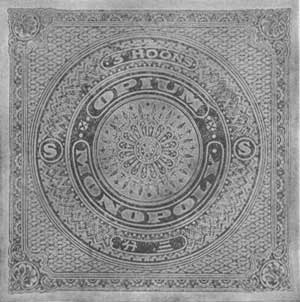

5. China and the Opium Wars
Why all this interest in China? Well, China, among other things, is one of the largest producers and users of opiates in the world.
For a while, in the 1800s, the Yankee Clippers in Connecticut and Massachusetts were the fastest ships on the ocean. Speed was crucial to the opium trade; whoever made the trip from Turkey/India to Macao/Hong Kong/Shanghai first got the most for their goods.
During the Opium Wars, the U.S. chose to stand on the sidelines and cheer for the English and French, knowing that treaty obligations would bring the U.S. a share in the spoils. Russell and Company was at times the only trading house operating in Canton and used the opportunity to developed strong commercial ties and handsome profits.
Powerful national interests were behind the drug trade, because American traders were badly in need of some article the Chinese would buy, since by this time the seal breeding grounds had been nearly wiped out. If the Chinese had not bought opium from Americans, then United States imports of silk, porcelain and tea would have to paid in precious coin, which was in short supply. In 1843, when the Port of Shanghai was opened, Russell and Co. was one of its earliest traders.
In 1903, Yale Divinity School set up a program of schools and hospitals in China. Mao Zedong was among the staff. During the intrigues of China in the 1930s and '40s, American intelligence called upon the resources of "Yale in China", and George Bush's cousin and fellow "Bonesman" Reuben Holden.
After stints as UN Ambassador and Chairman of the Republican National Committee for the beleaguered Richard Nixon, George Bush was sent to look after the "China trade". The Bush family is still very much involved in the economic activities of "Red" China.
Many researchers contend that George Bush has been with CIA since the early 1950s, and that one of his jobs was to consolidate and co-ordinate the worldwide narcotics industry, the largest industry on Earth. Some say that one of the reasons behind the Vietnam "Police Action" was a cover for the consolidation of the "Golden Triangle".
Next: The War on Drugs
Back to Menu